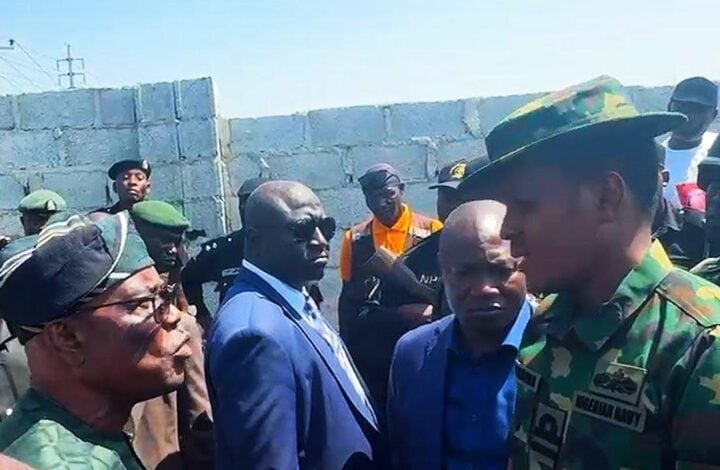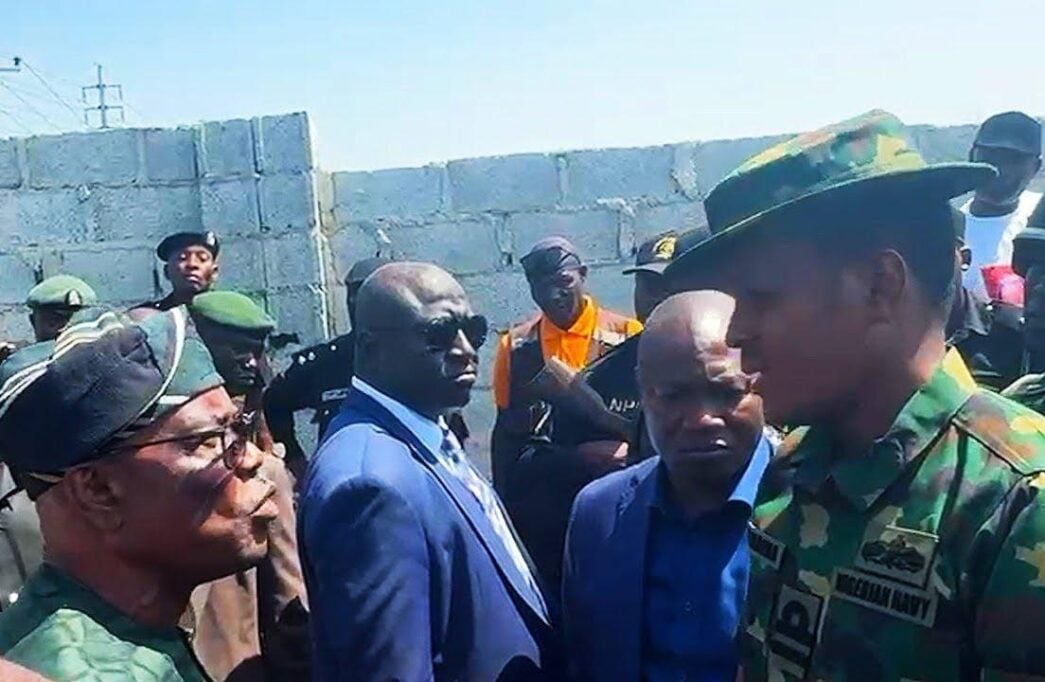Wike (left in traditional attire) clashes with military officer
BY PRATT ELIAS
On 11 November, a brief confrontation between Nigeria’s Minister of the Federal Capital Territory and a young naval officer swept across the country with the velocity of a nation primed for spectacle. A minister bristling with fury. A uniformed officer unmoved. Mobile phones capturing every second. The videos spread, commentary erupted, and the nation quickly split into camps.
For some, the minister’s abrasive tone was the scandal. For others, the young officer’s composure transformed him into a folk hero, a symbol of resistance against elite impunity. But beneath the frenzy lies a far more consequential question: What does it mean for a democracy when a uniformed serviceman obstructs a constitutionally empowered civilian authority and a significant portion of the public applauds?
This was not a clash of personalities. It was a warning, subtle but unmistakable, that something fundamental in Nigeria’s civil-military relations is beginning to shift.
At first glance, the encounter appeared straightforward: a minister attempting to access a site he described as an illegal development and a naval officer refusing to yield. Voices rose, tempers flared, videos circulated. Yet the true significance lies elsewhere. A serving officer blocked a minister performing a statutory duty. In any stable democracy, such a moment would trigger immediate concern, not because ministers are flawless, but because the Armed Forces cannot decide which civilians they will obey.
Advertisement
Every democracy rests on a core doctrine: the military must remain subordinate to civilian authority. This is not symbolic; it is structural. Carl von Clausewitz, in On War, described military force as a continuation of political intercourse carried on with other means. The military is therefore never an autonomous power. It is an instrument of the state, deriving its legitimacy from obedience to civilian direction. Clausewitz warned that once military power drifts outside political control, it becomes a threat, not a safeguard.
For Nigeria, a country scarred by coups and military rule, this doctrine is not an abstraction but a condition for national survival. The Constitution vests operational command in the President because the military must never become a self-directing force answerable to sentiment or personal loyalties. That is why the 11 November incident cannot be dismissed. The moment a junior officer feels entitled to obstruct a minister performing lawful duties, military discipline begins to drift away from constitutional restraint toward personal discretion and emotion, exposing the system to disorder.
A democratic society must be careful about the heroes it elevates. Applauding a soldier who confronts a minister may feel satisfying in a country frustrated by governance failures, but such applause is dangerous. It normalises the belief that a uniformed officer may assess, judge, and reject the authority of an elected or appointed official based on personal views or popular sympathy.
Advertisement
A widely circulated legal essay deepened the confusion by portraying the officer’s conduct as constitutional loyalty, relying on case law concerning property rights and state self-help. Those decisions, however, do not govern civil-military obedience. They regulate the limits of state power over citizens, not the obligations of the military to the civil authorities they serve.
To those who argue that the minister may have been acting improperly or beyond his powers, the constitutional remedy is not a naval officer’s instant judgment on the roadside. In a functional state, the recourse is judicial review, administrative oversight, or internal reporting within the security architecture. During peacetime, and knowing fully well that he was dealing with the Honourable Minister of the Federal Capital Territory Administration, the officer’s duty was to comply and then report through his chain of command. Substituting personal discretion for constitutional procedure is not the rule of law; it is its undoing.
One detail makes the situation even more troubling: the supposed superior who allegedly deployed the naval officer is a retired officer. A retired officer has no operational authority, no place in the chain of command, and no right to redeploy or direct serving personnel to another duty location without the consent of the proper deployment authority. Once serving officers begin to act on the informal directives of retired figures, the military re-enters the grey zone Nigeria has struggled for decades to escape, a space where shadow chains of command thrive and discipline fractures into private loyalties. This is not professionalism. It is institutional deterioration.
Nigeria confronted this danger once before. When President Olusegun Obasanjo returned as civilian president in 1999, he inherited an Armed Forces deeply intertwined with politics. Senior officers had served as governors, ministers, and administrators under successive military regimes. The boundary between barracks and government had vanished. President Obasanjo understood that unless the civil-military boundary was rebuilt immediately, the Fourth Republic would collapse. He instituted rapid measures to address the problem. This was not vindictiveness; it was democratic hygiene, a necessary reset to restore the constitutional wall between military structure and political authority.
Advertisement
He followed this with reforms to professionalise the military, dismantle shadow patronage networks, and reassert the principle that military legitimacy flows only from obedience to civilian authority.
Which is why the 11 November incident is so troubling. The very pathologies President Obasanjo sought to eliminate—ambiguous loyalties, retired officers influencing serving personnel, soldiers acting as filters to civilian authority—resurfaced in that brief encounter. A junior officer blocked a minister. A retired officer stood behind him. A substantial segment of the public applauded.
This is exactly the danger President Obasanjo feared: not dramatic coups, but subtle coups of sentiment in which the military is recast as the moral counterweight to elected leadership. Democracies rarely fall with tanks on the streets. They erode through small, celebrated breaches of civilian supremacy.
The confrontation of 11 November was not merely embarrassing. It was a quiet alarm, a sign that the boundaries sustaining Nigeria’s democracy are fraying. A soldier defied a minister. A retired officer was implicated. And a substantial portion of the public approved.
Advertisement
Nigeria cannot afford to forget what Clausewitz taught. Democracy survives only when the military remains firmly under civilian authority.
The response must therefore be firm and immediate. The military high command should reaffirm civilian supremacy through clear directives and, where necessary, disciplinary action. Political leaders must exercise authority with the legitimacy that commands respect rather than provokes defiance. And the public must recognise that cheering a man in uniform today may empower the very force that could one day dismantle their democracy. The remedy lies in institutional accountability, not viral defiance.
Advertisement
What happened on 11 November was a breach of constitutional provision. Under Section 1(a) of the Federal Capital Territory Act, the minister shall have a right of access at all times to any land or building within the Federal Capital Territory for the purpose of ascertaining that the provisions of this Act are not being contravened. Whether this moment becomes a turning point or a warning unheeded will test the maturity and resilience of Nigeria’s democracy.
There is an additional danger. Members of staff of the Federal Capital Territory Administration carrying out lawful assignments may now be exposed to physical threats if citizens begin to imitate the 11 November episode by resorting to force to defend their interests, whether legal or illegal. The outcome is predictable: a breakdown of law and order.
Advertisement
Elias writes from the Atlantic Coast.
Advertisement
Views expressed by contributors are strictly personal and not of TheCable.

